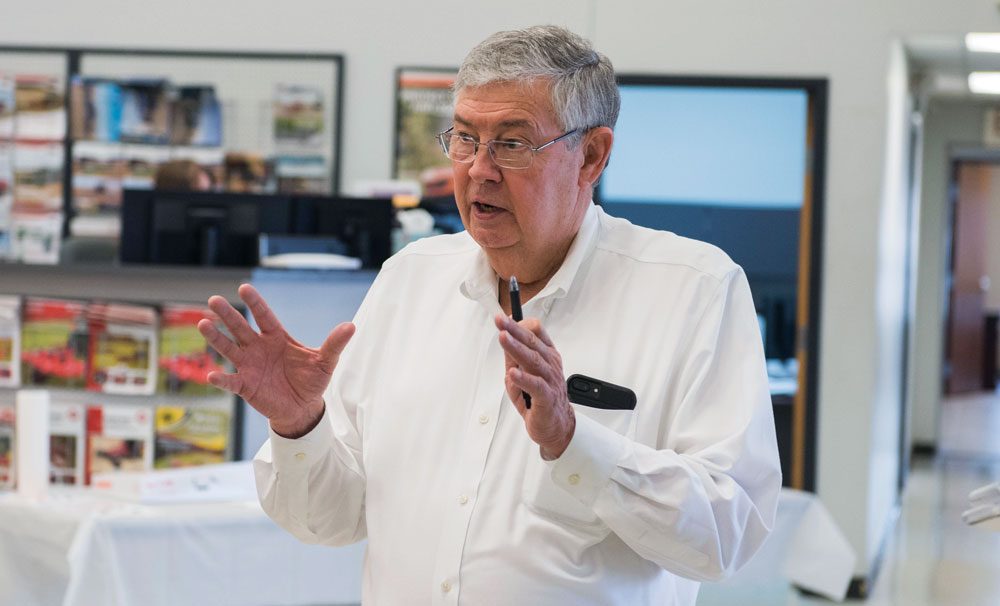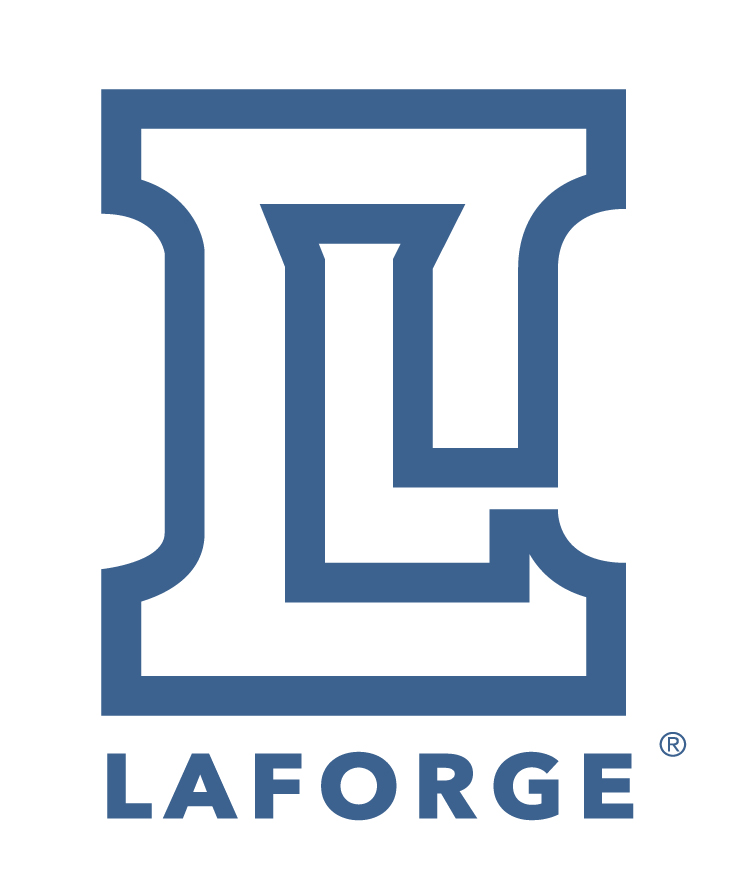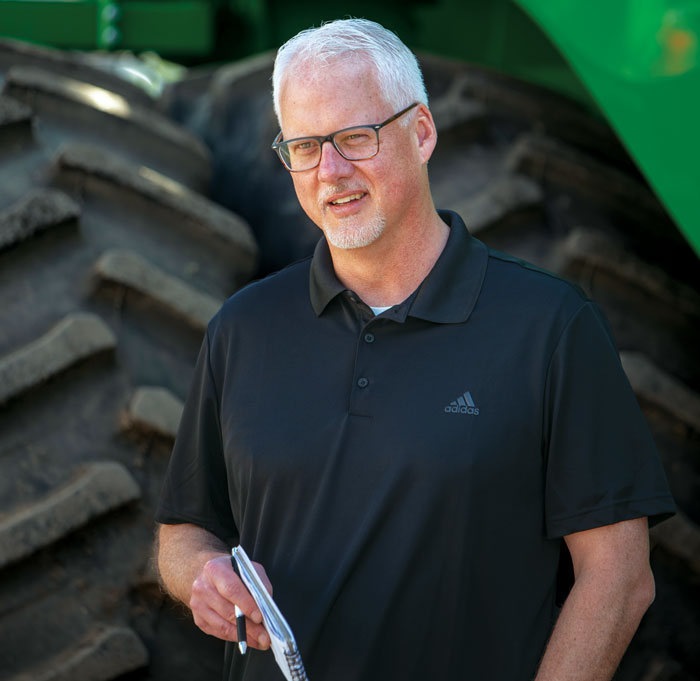Pictured Above: 1980s – Never Seen Anything Like It Before or Since. “The 1980s was the most economically depressed times we had in the farm equipment business, I’m told, since the Great Depression,” says Ross Morgan, Special Projects. “Interest rates were in the high teens, commodity prices were very low, and in this area of the state, we had the worst drought on record in 1983. That was prior to having hybrids that would compensate for adverse weather. We watched 4 of our major suppliers, tractor manufacturers, go out of business. We saw our customers and a whole lot of other companies go out of business. We saw people lose their livelihood and their homes. It was tough; all of them had families to support, and we were acquainted with and knew them personally.”
Ross Morgan, Special Projects
Years with Organization: 56
Background: Joined father in-law’s farm equipment dealership, H&R Implement, in 1964.
Quotable: “Don’t ever lie to the guy you see in the mirror when you shave each morning. Recognize what you can’t change, and don’t pretend someone else is going to fix your problems. They can’t. Try and figure out what it is you can change and make a decision.”
Ross Morgan, a farm equipment dealership lifer, is a face you’ll still see at many industry events, including dealer association meetings and the Dealership Minds Summits. But you won’t necessarily hear him, however. His demeanor is quiet and calm, but this industry sage remains present, up to date and willing to share. Just this week in an unrelated conversation, Morgan was cited as an example of a “true servant leader” by one who keeps inventory of leadership traits and examples in the industry.
Wayne Hunt brought resources, multi-location business expertise and an appetite for large growth. But without Morgan, the large-scale entity we know today may never have existed. Well before either thought of becoming business partners, it was Morgan who encouraged Hunt to pursue an opportunity, even though it meant Morgan would have to compete with him.
In 1990, Morgan was running H&R Implement, a single-store New Holland operation that he and his wife, Brenda, had fully owned since 1978 (Brenda’s father, Dalton Hancock had founded the company in 1958, 6 years before Morgan started his career at the dealership). Hunt, meanwhile, was running two large fertilizer business.
“We were visiting Wayne in the hospital and he was telling me about this opportunity he had — what he called ‘an idle thought.’ I joked ‘He never has idle thoughts.’ Wayne explained to me about the opportunity for him to buy the Case IH company store here in town. I told him, ‘I think it’s a good opportunity.’ I felt like if he didn’t do it, someone else would. Three days later he called and said, ‘We’re competitors now.’”

Pictured is Ross Morgan at the 2020 National No-Tillage Conference in St. Louis. He attended on behalf of H&R Agri-Power, which sponsored the Harry F. Young Memorial Lecture, named in honor of the Young farm where no-till’s first commercial plot went up in 1962. Like the Youngs, H&R Agri-Power’s headquarters is considered at “ground zero” for no-tillage.
Three years later, though, Hunt called Morgan and said, “This thing is not exactly what I thought it was,” recalls Morgan. “In less than a day’s time of meetings, we decided to go forward with the merger — our 2 locations in Hopkinsville, and his in Russellville, Ky.”
That would be an important decision for the Hunts and Morgans, and their employees and customers. “Even though we have the same customer base, different skillsets are required in the fertilizer and equipment businesses. Wayne was fully occupied with the other business and he didn’t have time to devote to the farm equipment, so we agreed to merge the two companies together as equal partners.”
Morgan reflects on that decision. “I could see that a small stand-alone store was going to struggle to compete. Wayne was already running multiple locations on the fertilizer side of the business. That experience and expertise in running multiple outlets and was a skill I didn’t have. I had not done that.”
Meanwhile, Morgan brought the operational knowledge to the table. “Sales, service, parts — all those things are unique to this industry. He had people in place to do that, but he wanted me to do that, and I saw the opportunity to expand with Case IH.”
When asked what Morgan thought was possible in 1993, he considered Western Kentucky a lofty goal. Morgan never dreamt the business would grow to the 17 locations it is today across 6 states and employing 450.
Morgan noted that his dealership had long understood service was where the profitability existed, well before the word “absorption” was common in the industry. But when asked what is truly unique for H&R among its peers, he noted its “farmer’s mentality,” referring to the uniqueness of a 11,000-acre farm that is within the organization. “We are actively involved in farming. That gives us the opportunity to stay abreast of what’s happening on the farm, that’s progressive. This is a very progressive area, and we’re part of that, that’s part of our makeup. We’re recognizing new practices, accepting them and always on the lookout for anything that’s new and changing.” (For more on Hunt Farms, see “Connecting On-Farm Experience with Customer Engagement.)
Most of the hours-long “Dealership Minds” interviews with Morgan will be developed as a still-to-come special project on his front-row seat as chairman of the Dealer Council of White Farm Equipment. Until then, here’s a few additional anecdotes from Morgan.
Access to New Holland
The exchange with Hunt in the hospital and eventual merging was not the first time Morgan’s investment in relationships paid dividends for his business.
It was a friendship with another dealership that, as it would turn out, helped Morgan stay in business in the 1980s. Morgan talked about how in 1983, the John Deere dealership Roeder Brothers (Edwin and Albert Roeder) also held the New Holland contract. What transpired between the Roeder Brothers and New Holland, he did not know. But Morgan had learned that Edwin said, “We don’t need the New Holland contract, but Ross does.”
They, in fact, suggested that the New Holland line go to their friend Morgan, who was in a tough spot with the near-certain path of bankruptcy of White Farm Equipment, as its major supplier. “The Roeders didn’t have to do that,” says Morgan.
“That’s how I got New Holland and I saw what the opportunity was for hay tools in this market. That year, 1983, was the worst drought on record, but it didn’t quit raining until June, so we did sell hay tools.
“It’s safe to say H&R would not have survived the decade of the 1980s without New Holland. We were the only dealership in town at that time that was focused on hay equipment. Then in 1986, after Ford bought New Holland, I was able to get the Ford tractor contract in 1986. It was well accepted and with the utility tractors in this market, a good population. Those two things helped me to survive the 1980s. I don’t think I would’ve survived had I just stayed with White.”
AGCO eventually got the assets of White and H&R’s contract was cancelled in the mid-1990s, which Morgan said he understood as they were not performing in sales and service.
‘Interesting’ Experience: Chairing Dealer Council Through White Farm Equipment’s Bankruptcy

Ross Morgan walks Farm Equipment through his White Farm Equipment binder, which included correspondence from 1981-1988.
Ross Morgan was also right in the middle of a most unique period in the farm equipment industry. As a 41-year-old, he was chairman of the Dealer Council for White Farm Equipment throughout its bankruptcy and had compiled a history of correspondence from that time, which still offers lessons to the current industry. Morgan, through this exclusive interview with Farm Equipment, shares this storied history, with notes of a hostile conference call, an OEM who also had a vehicle business that required resources and attention, and how dealers and customers reacted to the announcements in the Wall Street Journal. Morgan’s reactions to reviewing the correspondence of that time, decades later, will be covered in a future Farm Equipment project.
Morgan shared how competitors would help each other out back in those days. “We were competitive, but we got along. If somebody needed a forklift, you’d loan them one. If your truck went down, you could borrow one — things like that. We knew everybody. Christian County is a big county, but we had a common customer base and we knew everybody.”
Morgan said he’s not aware of that sort of thing happening anymore. Not because of animosity per se, but also because dealers don’t know each other as well these days.
Specialty Lines as Entry Tool
Morgan had applied for a patent on a planter earlier in his career and was often tinkering with Wesley Hunt (Wayne’s brother) on ways to improve planters. “My wife convinced me that I shouldn’t be doing that, I wasn’t an engineer, and we pulled back from that. But I learned a lot about planters through those days.” Interestingly, Morgan arranged some meetings that moved other planter innovations commercially forward.
Morgan, who pays close attention to machinery developments to this day, relied on innovation to stay afloat.
His business didn’t have the choice to access some suppliers, “so we had started picking up shortlines to meet the needs of our customers in this market. Kinze was one of the first shortlines we picked up, for planters. Then we picked up Krause tillage, and later we got the Hesston line. We picked it up, actually to keep the tractor that we had been selling from White but with that we discovered there was a market here for hay equipment.”
That was important when they got the chance for the New Holland contract that the Roeder Brothers steered their way, because they knew a market existed for hay equipment. “The other dealers in this market were not focused on hay equipment. Some were selling it, but then they also had other lines I didn’t have. Those lines we picked up helped us survive.
“Those shortlines helped get us onto farms loyal to another brand. We called them entry tools,” he said. “Some customers wouldn’t buy our tractor, but they would buy our planter, tillage or hay products.”
Conceiving of the Power EQ Quoting Tool
A guy who never saw a computer in grammar school was the one whose brainchild today is Power EQ.
The genesis for that program was started by Morgan, who called it a “quoting tool.” He recalls: “I was looking at what somebody was doing one day in a spreadsheet and I saw the formula bar, and I said, “That’s an algebraic equation — that’s 8th grade algebra, I can do that.”
[Podcast] Early Equipment and Practices from the Heart of No-Till Country
Listen in as Ross talks about working with no-till innovators such as Howard Martin, Eugene Keeton and Harry Deckler; why Case IH took its first no-till planter off the market; the four elements that are critical to even corn and soybean emergence; the role the combine plays in no-till systems; how the Russian embargo of 1981 affected the ag industry; and more!
Morgan built a coding system that eventually utilized a PDF formatted price book with an Adobe license that could be nested within the spreadsheet and maintain its format. “Then I would pull that into a sales analysis with a trade discount and that tab is linked to your programs.”
Morgan downplays the system he created. “Actually, anyone who’s ever figured the cost of a machine can do the same thing. It’s the same thing except it’s done as a spreadsheet.
The bottom line is it would allow even an inexperienced salesperson to spec out a combine and calculate costs with your current programs.” Morgan had the data expanded to virtually everything but cotton pickers and hay equipment, and Case IH even got excited about and asked to use it.
“About 5 years ago, I sat down with Wayne and I said, “What happens if I don’t get up in the morning? I can show someone else how to do this. But if we’re going to stay with this program and expand it, we need to put it in a database of some kind.
“Sheila DeMoss came into be a liaison between me and a programmer, and after that meeting, Sheila and the others developed what would eventually turn into what we call Power EQ, which now pulls data from the business system. It also has a call tracking and call reporting system built in today and is more than just a pricing system. It’s a management tool as well.”
H&R has licensed that program to two Illinois dealers. For more information on it, see the webinar at www.Farm-Equipment.com/PowerEQ.
Dealership Minds 2020 Overview: H&R Agri-Power
Dealership Minds: Leading the Charge
Dealership Minds: Sage Wisdom from A Dealership Lifer
Dealership Minds: Building H&R Agri-Power’s Culture, Profitability
Dealership Minds: CFO: ‘Conducting’ the Orchestra
Dealership Minds: Measuring Sales Success Through Customer Satisfaction
Dealership Minds: Creating a Reputation that Sells Equipment
Dealership Minds: Connecting On-Farm Experience with Customer Engagement
Dealership Minds: Managing the Measurables of a Precision Business
Dealership Minds: Financing Solutions to Keep Sales Selling
Dealership Minds: Coaching the Sales Team to Dealership-Wide Success
Dealership Minds: Maintaining High Standards of Service
Dealership Minds: Following the Data & Managing Relationships to Order Equipment Properly
Dealership Minds: Leading by Example in the Parts Department









Post a comment
Report Abusive Comment